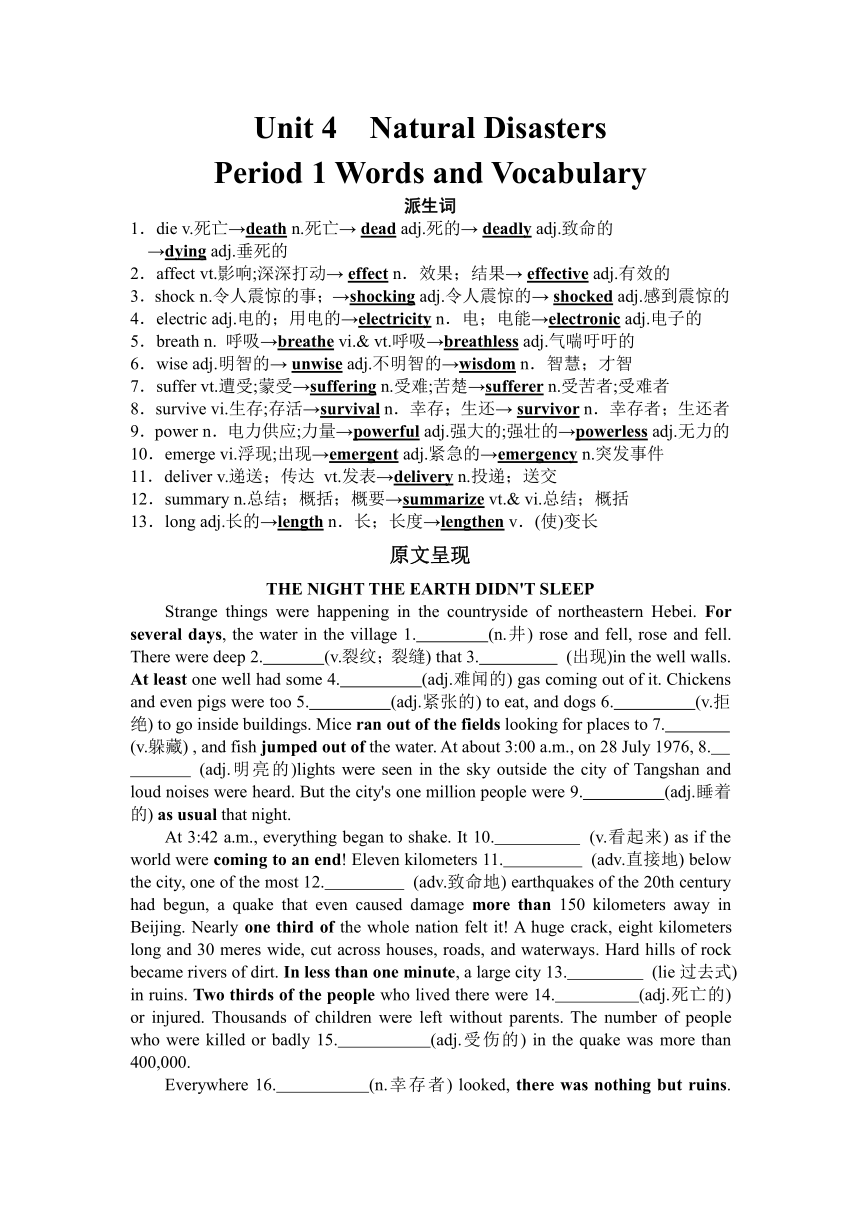
Unit 4 Natural Disasters Period 1 Words and Vocabulary 派生词 1.die v.死亡→death n.死亡→ dead adj.死的→ deadly adj.致命的 →dying adj.垂死的 2.affect vt.影响;深深打动→ effect n.效果;结果→ effective adj.有效的 3.shock n.令人震惊的事;→shocking adj.令人震惊的→ shocked adj.感到震惊的 4.electric adj.电的;用电的→electricity n.电;电能→electronic adj.电子的 5.breath n. 呼吸→breathe vi.& vt.呼吸→breathless adj.气喘吁吁的 6.wise adj.明智的→ unwise adj.不明智的→wisdom n.智慧;才智 7.suffer vt.遭受;蒙受→suffering n.受难;苦楚→sufferer n.受苦者;受难者 8.survive vi.生存;存活→survival n.幸存;生还→ survivor n.幸存者;生还者 9.power n.电力供应;力量→powerful adj.强大的;强壮的→powerless adj.无力的 10.emerge vi.浮现;出现→emergent adj.紧急的→emergency n.突发事件 11.deliver v.递送;传达 vt.发表→delivery n.投递;送交 12.summary n.总结;概括;概要→summarize vt.& vi.总结;概括 13.long adj.长的→length n.长;长度→lengthen v.(使)变长 原文呈现 THE NIGHT THE EARTH DIDN'T SLEEP Strange things were happening in the countryside of northeastern Hebei. For several days, the water in the village 1. (n.井) rose and fell, rose and fell. There were deep 2. (v.裂纹;裂缝) that 3. (出现)in the well walls. At least one well had some 4. (adj.难闻的) gas coming out of it. Chickens and even pigs were too 5. (adj.紧张的) to eat, and dogs 6. (v.拒绝) to go inside buildings. Mice ran out of the fields looking for places to 7. (v.躲藏) , and fish jumped out of the water. At about 3:00 a.m., on 28 July 1976, 8. (adj.明亮的)lights were seen in the sky outside the city of Tangshan and loud noises were heard. But the city's one million people were 9. (adj.睡着的) as usual that night. At 3:42 a.m., everything began to shake. It 10. (v.看起来) as if the world were coming to an end! Eleven kilometers 11. (adv.直接地) below the city, one of the most 12. (adv.致命地) earthquakes of the 20th century had begun, a quake that even caused damage more than 150 kilometers away in Beijing. Nearly one third of the whole nation felt it! A huge crack, eight kilometers long and 30 meres wide, cut across houses, roads, and waterways. Hard hills of rock became rivers of dirt. In less than one minute, a large city 13. (lie过去式) in ruins. Two thirds of the people who lived there were 14. (adj.死亡的) or injured. Thousands of children were left without parents. The number of people who were killed or badly 15. (adj.受伤的) in the quake was more than 400,000. Everywhere 16. (n.幸存者) looked, there was nothing but ruins. Nearly everything in the city was 17. (v.摧毁). About 75 percent of the city's 18. (n.工厂) and buildings, 90 percent of its homes, and all of its hospitals were 19. (adj.不复存在的). Bricks covered the ground like red autumn leaves, but no wind could blow them away. Most bridges had fallen or were not safe to cross. The railway 20. (n.轨道) were now 21. (adj.无用的) pieces of 22. (n.金属). Tens of thousands of cows, hundreds of thousands of pigs, and ... ...
~~ 您好,已阅读到文档的结尾了 ~~

